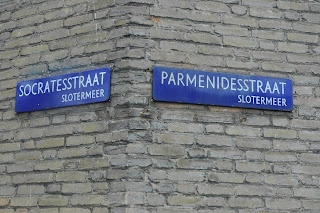

“Beyond the walls of your room, which you perceive at this moment, there are the adjoining rooms, then the rest of the house, finally the street and the town in which you live. It signifies little to which theory of matter you adhere; realist or idealist, you are evidently thinking, when you speak of the town, of the street, of the other rooms in the house, of so many perceptions absent from your consciousness and yet given outside of it.” (Bergson)

“You walk down the street, one house looks like the other, and only the experienced observer suspects that in that house, at midnight, everything looks quite different: an unhappy person wanders about, unable to rest; he climbs the stairs, his steps echo in the stillness of the night. We pass one another in the street, the one person looks like the other, and the other just like anyone else, and only the experienced observer suspects that, in that head, there lives a lodger who has nothing to do with the world, but lives out his lonely life confined to quiet domesticity.” (Kierkegaard)

“Therefore nature is always ready to let the individual fall, and the individual is accordingly not only exposed to destruction in a thousand ways from the most insignificant accidents, but is even destined for this and is led towards it by nature herself, from the moment that individual has served the maintenance of the species.” (Schopenhauer)


“The shapes of consciousness are not fully conscious of themselves as shapes of consciousness, nor of their place in a continuous conscious history, until the end of the road is reached.” (Hegel)

“But conquest is as far from setting up any government as demolishing a house is from building a new one in the place.” (Locke)

“’Have sensations, as a dog does, or think, as an ape does, or imagine, as a mule does.’ Here my critic is laying the ground for a battle about terminology.” (Descartes)


“- But then, what is to become of philosophy? Whither shall we turn, if the ideas are unknown?
- I certainly do not see my way at present.
- Yes, said Parmenides; and I think that this arises, Socrates, out of your attempting to define the beautiful, the just, the good, and the ideas generally, without sufficient previous training. I noticed your deficiency, when I heard you talking here with your friend Aristoteles, the day before yesterday. The impulse that carries you towards philosophy is assuredly noble and divine; but there is an art which is called by the vulgar idle talking, and which is often imagined to be useless: in that you must train and exercise yourself, now that you are young, or truth will elude your grasp.” (Plato)

“When the home is a gloomy solitude pleasure will be sought elsewhere.” (Rousseau)

“We found a vanity upon houses, gardens, equipages, as well as upon personal merit and accomplishments; and tho’ these external advantages be in themselves widely distant from thought or a person, yet they considerably influence even a passion, which is directed to that as its ultimate object. This happens when external objects acquire any particular relation to ourselves, and are associated or connected with us.” (Hume)


No comments:
Post a Comment